NUMARK NS6
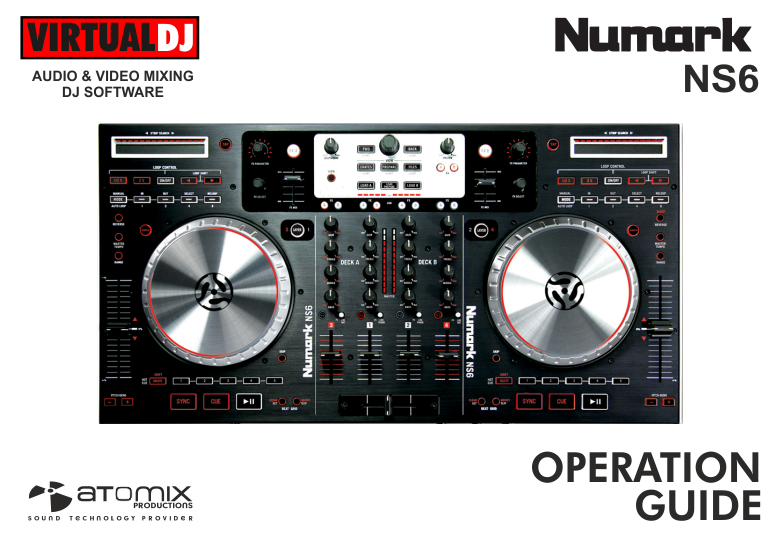
SETUP
Firmware & Drivers
Windows & Mac
Depending on your Operating system, install the necessary drivers for the unit from http://www.numark.com/product/ns6
VirtualDJ 8 Setup
Once VirtualDJ 8 is opened, a Login Window will appear. Login with your virtualdj.com (Google or Microsoft) account’s credentials or create one at http://www.virtualdj.com/users/register.html
A Pro Infinity or a Subscription License is required to use the Numark NS6 Without any of the above Licenses, the controller will operate for 10 minutes each time you restart VirtualDJ.
http://www.virtualdj.com/buy/index.html

Click on the Use Soundcard button in order VirtualDJ to apply the pre-defined audio configuration (speakers need to be connected to the rear panel of the unit in this case)
Click on the Change Skin button to load the preferred 4 Decks default VirtualDJ Skin.
Click to OK
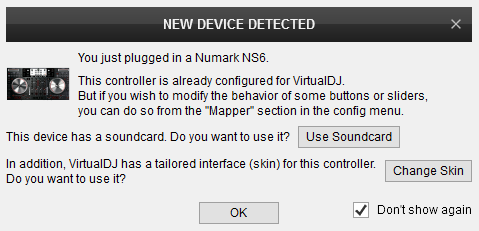
The unit is now ready to operate.
MIDI Operation
The unit should be visible in the CONTROLLERS tab of Config and the “factory default” available/selected from the Mappings drop-down list.

The factory default Mapping offers the functions described in this Manual, however those can be adjusted to your needs via VDJ Script actions.
Find more details at http://www.virtualdj.com/wiki/VDJ8script.html
AUDIO Setup
The unit has a pre-defined Audio setup and a special button in the AUDIO tab of Config to provide that. Alternative Audio setups can be applied in the same window.
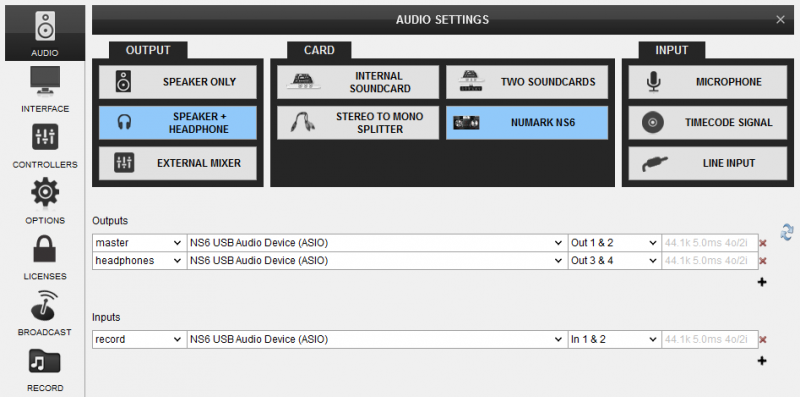
For further software settings please refer to the User Guides of VirtualDJ 8.
http://www.virtualdj.com/manuals/virtualdj8/index.html
CONTROLS
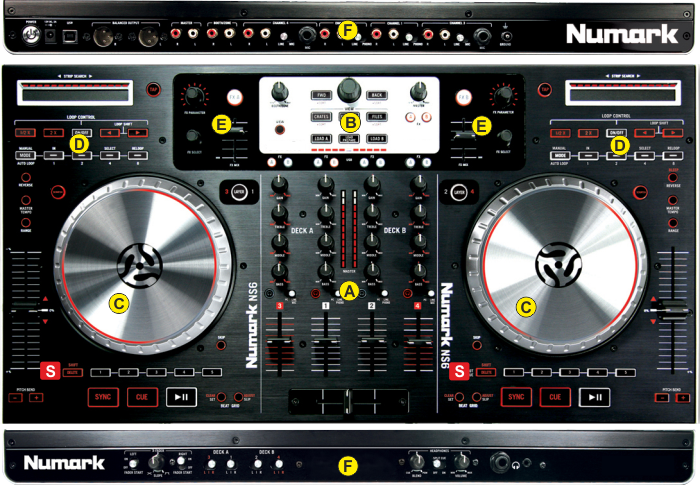
S. SHIFT. Press and hold this button to access secondary functions of other controls on the Numark NS6
The functionality of each button and knob per section (as shown in the image above) will be explained in detail in the next chapters
A. Mixer
B. Browser & Sampler Controls
C. Deck Controls
D. Loops
E. Effects
F. Front & Rear panels
MIXER
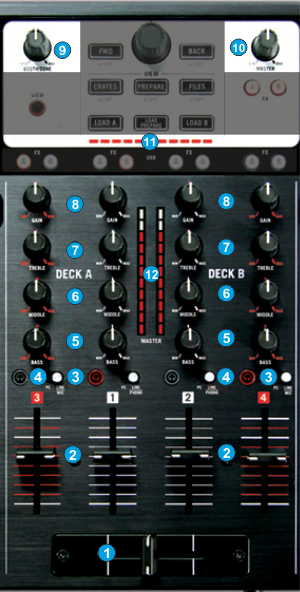 The mixer of the NS6 offers controls for 4 channels at a pre-defined 3-1-2-4 channel order*, and each mixer channel can be assigned to a software or analogue source input.
The mixer of the NS6 offers controls for 4 channels at a pre-defined 3-1-2-4 channel order*, and each mixer channel can be assigned to a software or analogue source input.If a mixer channel is set to LINE Source, the Volume, EQ and Gain faders will still control the software ones (will move the related faders of the software mixer on the skin), but the sound of the software deck will be muted.
* The mixer channel order can be changed from VirtualDJ Settings to a different one.
- CROSSFADER. Blends audio between the channels assigned to the left and right side of the crossfader.
- VOLUME. Control the Volume of each channel
- INPUT SELECTOR. Set this switch to the desired audio source for each channel
PC: a track playing on that layer in the software.
LINE: a device connected to the Line Inputs (or Mic) on NS6's rear panel. - PFL. Press these buttons to send this channel's pre-fader signal to the Cue Channel for monitoring. When engaged, the button will be lit. By pressing one PFL button at a time, you will cue that channel alone (and deactivate PFL monitoring for the other channels).
To prelisten to multiple channels simultaneously, press the PFL buttons for those channels at the same time. - EQ BASS. Adjusts the low (bass) frequencies of the corresponding channel in the software or hardware Input.
- EQ MIDDLE. Adjusts the middle (mid) frequencies of the corresponding channel in the software or hardware Input.
- EQ TREBLE. Adjusts the high (treble) frequencies of the corresponding channel in the software or hardware Input.
- GAIN. Adjusts the audio level (gain) of the corresponding channel in the software or hardware Input.
- BOOTH VOLUME. Adjusts the Booth Output Volume (Hardware operation. Movement will not be visible on the VirtualDJ GUI)
- MASTER VOLUME : Adjusts the Master Output Volume (Hardware operation but movement will be visible on the VirtualDJ GUI)
- BEATDIFF BAR. This meter is an aid for matching the CBG of both decks. When the white center LED is lit, the CBGs of the left and right selected decks are matched. Otherwise, the meter will tend towards the faster deck. The further from center, the greater the difference between the two BPMs.
- VU METERS: Indicate the output volume routed to the Master Output. Note that these VU meter Leds are controlled by the Hardware and will not offer any indication is a different sound card (other than the built one of the NS6) is selected in the Audio configuration of VirtualDJ.
Browser & Sampler
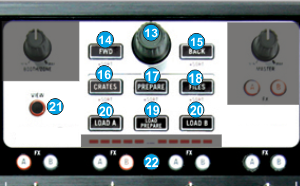
- BROWSE ENC. Scrolls through Folders or Files.
If a track is playing at the Prelisten Player, hold SHIFT down and then use the Scroll knob to navigate through the pre-listened song
BROWSE PUSH. If focus is on the Folders List, sets focus to the Songs list. If focus is on the Songs list loads the selected track to the first available (free or stopped deck)
Hold SHIFT down and then push the Browse Encoder to play/stop the selected track to the Prelisten Player. - BACK. Sets focus to the previous Browser Window. Hold SHIFT down and then press this button to sort the Songs List by Track Number field.
- FWD. Sets focus to the next Browser Window. Hold SHIFT down and then press this button to sort the Songs List by Album field.
- CRATES: Sets focus on Folders Window. If focus is on the Folders list, press this button to expand/collapse sub-folders.
Press and hold SHIFT and then press to sort the Songs List by Title field. - PREPARE. Press this button to set focus to the Sideview window of Browser. If focus is on the SideView already, press this button to cycle though the available views of Sideview (Automix, Sidelist, Sampler, Karaoke and Clone). Hold the same button down for more than 1 second to open/close Sideview
Hold SHIFT down and then press this button to sort the Songs List by Artist field. - FILES. Sets focus to the Songs List of Browser. Hold SHIFT down and then press this button to sort the Songs List by BPM field.
- LOAD PREPARE. Adds the selected track from the Songs List to the Automix List of Sideview. Hold SHIFT down and then press this button to add the selected song to the Sidelist of Sideview.
- LOAD A/B. Press this button to load the selected track from the Browser to the left (A) or right (B) assigned deck Hold SHIFT down and then press this button, to unload the same left or right assigned deck
- VIEW. Press this button to toggle between Browser Zoom (with Mini decks) and Normal view.
Hold SHIFT down and then press this button to cycle through the available center mixer panels of the Default VirtualDJ GUI (MIXER, VIDEO, SCRATCH and MASTER) - FX A/B. Use these buttons to trigger the first 8 Samples (from left to right) from the selected/loaded Sampler Bank of VirtualDJ. Depending on the selected trigger mode, hold SHIFT down and then use the same buttons to stop the triggered sample.
Deck Controls
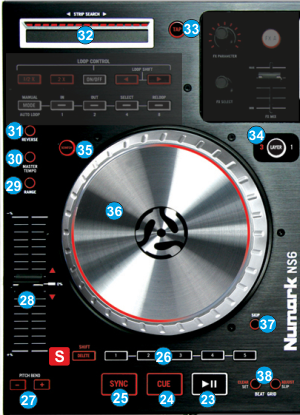
- PLAY. Plays / Pauses the track.
- CUE. When the Deck is paused, you can set a temporary Cue Point by moving the Platter to place the Audio Pointer at the desired location and then pressing the Cue Button.
During playback, you can press the Cue Button to return the track to this Cue Point. (If you did not set a Cue Point, then it will return to the beginning of the track.).
If the Deck is paused, you can press and hold the Cue Button to play the track from the Temporary Cue Point. Releasing the Cue Button will return the track to the temporary Cue Point and pause it. To continue playback without returning to the Temporary Cue Point, press and hold the Cue Button, then press and hold the Play Button, and then release both buttons.
Press and hold SHIFT and then press this button to return to the beginning of the track. - SYNC. Press this button to automatically match the corresponding Deck's tempo with the opposite Deck's (or the Master Deck’s if using a 4 decks Skin) tempo and phase.
Hold SHIFT down and then press this button to set this deck as Master Deck (for 4 decks skins - All other decks will sync to the Master Deck). - HOTCUES (1-5). Assigns a Hot Cue Point or returns the track to that Hot Cue Point. When a Hot Cue Button is unlit, you can assign a Hot Cue Point by pressing it at the desired point in your track. Once it is assigned, the Hot Cue Button will light. To return to that Hot Cue Point, simply press it.
Press and hold SHIFT and then press a Hot Cue Button to delete its assigned Hot Cue Point. - PITCH BEND. Press and hold down these buttons to temporary speed up/slow down the song while pressed. When released, the track playback will return to the speed designated by the Pitch Fader
- PITCH. Adjust the track's playback speed (tempo). The white LED next to the fader will light up when the software pitch value is set at 0%. The Red Up and Down Arrow LEDs will lit if the pitch position of the unit and the actual pitch of the software do not match, to indicate the direction you need to move the hardware fader in order to catch the software one.
- RANGE. Press this button to adjust the range of the Pitch Fader ( to ±6%, ±8%, ±10%, ±12%, ±20%, ±25%, ±33%, ±50%, and ±100%).
- MASTER TEMPO. Press this button to "lock" the track's pitch to its original key. The track's tempo will remain at the speed designated by the Pitch Fader
- REVERSE/BLEEP. Press and hold this button down to play the track in reverse. Once released, the track will resume normal playback from where it would have been if you had never pressed the Bleep button (i.e., as if the track had been playing forward the whole time).
Hold SHIFT down and then press this button to play the track in reverse. The led of this button will blink to indicate the reversed playback. - STRIP SEARCH. The length of this strip represents the length of the entire track. Place your finger on a point along this sensor to jump to that point in the track (song position).
- TAP. Manually adjust the tempo of the song. Tap this button at the same tempo as the track (for at least 4 times) to help the software detect a different BPM reading (if needed).
- DECK SELECT. Switch Left decks (1 and 3) and Right Decks (2 and 4). The left side of the NS6 will control VirtualDJ decks 1 or 3, and the right side will control VirtualDJ decks 2 or 4.
- SCRATCH. Press this button to set the platter of the NS6 to either Scratch (Vinyl) or Bend (CD) mode. On Bend mode, use the outer part of the platter for pitch bending.
Hold SHIFT down and then press this button to activate the Slip mode. When Slip mode is activated, several actions (scratching, HotCues and loops) will act temporary and the track will resume to the position it would have been if this action was never triggered. - JOG. Touch sensitive jogwheel. Use this wheel to scratch, bend, fast seek through a track or even adjust the Loop In, Loop Out and Loop position depending on the assigned mode..
- SKIP. Press and keep this button down and then use the jogwheel to navigate through the loaded track. The track will move forward/backwards by 1 beat steps, so the track will remain at sync.
- BEAT GRID. These buttons offer the ability to manually adjust the CBG of the track. Similar operations are offered at the BPM Editor of VirtualDJ 8.
SLIP/ADJUST. Press and hold this button and then move the JOGWHEEL to shift the position of the CGB of the track.
Hold SHIFT down and then press this button and use the JOGWHEEL to adjust the width of the CGB of the track (equal to adjust the BPM of the track)
SET/CLEAR. Press this button to set the current position of the track as the First Beat (BeatGrid Anchor) in order to easier adjust the Beatgrid width
Hold SHIFT and then press this button to re-analyze the track and bring BPM and phase back to the original values as calculated by VirtualDJ.
Loops
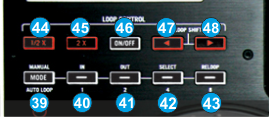
- MODE. Use this button to select how the IN, OUT, SELECT and RELOOP buttons will behave.
If the Manual mode is selected the Led of this button will be lit white and if the Auto Loop mode is selected will be lit red.
- LOOP IN.
Manual mode (white Led)
Use this button to set a Loop In (Entry) point for manual loop. If a loop is triggered, press this button to set the Jogwheel to Loop In Adjust mode (led will blink) and use the jogwheel to fine adjust the Loop In position.
Auto mode (red led)
Use this button to trigger a 1 beat Loop.
SHIFT action (in both modes)
Hold SHIFT down and then press this button down to trigger a momentary (as long as the button is pressed) Loop Roll of 1/8 beat. Once the button is released, the track will resume to the position it would have been if the Loop Roll was never triggered. - LOOP OUT.
Manual mode (white led)
Use this button to set a Loop Out (Exit) point for manual loop. If a loop is triggered, press this button to set the Jogwheel to Loop Out Adjust mode (led will blink) and use the jogwheel to fine adjust the Loop Out position.
Auto mode (red led)
Use this button to trigger a 2 beats Loop.
SHIFT action (in both modes)
Hold SHIFT down and then press this button down to trigger a momentary (as long as the button is pressed) Loop Roll of 1/4 beat. Once the button is released, the track will resume to the position it would have been if the Loop Roll was never triggered. - SELECT.
Manual mode (white Led)
Enable/disable Smart Loop. When Smart Loop is enabled, manual loops will be automatically converted to auto-loops.
When a Loop is triggered, use this button to set the Jogwheel to Loop Move Adjust mode (led will blink) and use the jogwheel to fine move/shift the Loop through the track.
Auto mode (red led)
Use this button to trigger a 4 beats Loop.
SHIFT action (in both modes)
Hold SHIFT down and then press this button down to trigger a momentary (as long as the button is pressed) Loop Roll of 1/2 beat. Once the button is released, the track will resume to the position it would have been if the Loop Roll was never triggered. - RELOOP.
Manual mode (white Led)
Use this button to trigger the last triggered Loop (Reloop) or jump to the Loop In point if a loop is already triggered.
Auto mode (red led)
Use this button to trigger a 8 beats Loop.
SHIFT action (in both modes)
Hold SHIFT down and then press this button down to trigger a momentary (as long as the button is pressed) Loop Roll of 1 beat. Once the button is released, the track will resume to the position it would have been if the Loop Roll was never triggered. - HALF (/2). Use this button half the size (in beats) of the loop
- DOUBLE (x2). Use this button double the size (in beats) of the loop
- ON/OFF. Use this button to trigger a loop of the selected size, or exit a Loop
- SHIFT<. Use this button to move the triggered loop backwards by 1 beat
- SHIFT>. Use this button to move the triggered loop forward by 1 beat
Effects
The NS6 offers 2 FX units (A and B) which are assigned to control the Effects on the left assigned deck (FXA), on the right assigned deck (FXB) or the Video Transition and Video Effects on Master (assigned with the MASTER FX A and B buttons)

- FXA/FXB button
Press this button to trigger the selected Effect on either the left or right assigned decks.
If the MASTER FX A button is pressed, use the FXA button to trigger the selected Video Transition
If the MASTER FX B button is pressed, use the FXA button to trigger the selected Video Effect on Master - FX MIX fader.
Use this fader to control the 1st parameter of the selected Effect..
If the MASTER FX A button is pressed, use the left MIX fader to control the 1st parameter of the selected Video Transition
If the MASTER FX B button is pressed, use the right MIX fader to control the 1st parameter of the selected Video Effect on Master - FX SELECT encoder.
Use this encoder to select an Effect from the Effect list of VirtualDJ. Push the encoder to open/close the GUI of the selected Effect in the Browser in order to see and control (via the GUI) more effect parameters.
If the MASTER FX A button is pressed, use the left FX SELECT encoder to select a Video Transition. Push the encoder to open/close the GUI of the selected Video Transition in the Browser in order to see and control (via the GUI) more effect parameters (if available).
If the MASTER FX A button is pressed, use the right FX SELECT encoder to select a Video Effect for Master. Push the encoder to open/close the GUI of the selected Video Effect in the Browser in order to see and control (via the GUI) more effect parameters (if available). - FX PRM knob.
Use this knob to control the 2nd parameter of the selected Effect. Hold SHIFT down and then use the same knob to control the 3rd parameter of the selected Effect.
If the MASTER FX A button is pressed, use the left FX PRM knob to control the 2nd parameter of the selected Video Transition (if available). Hold SHIFT down and then use the same knob to control the 3rd parameter of the selected Video Transition (if available).
If the MASTER FX B button is pressed, use the right FX PRM knob to control the 2nd parameter of the selected Video Effect on Master (if available). Hold SHIFT down and then use the same knob to control the 3rd parameter of the selected Video Effect on Master (if available). - FX MASTER ASSIGN A/B. If FX MASTER A is enabled, the left FXA unit of the NS6 will control the Video Transition. If FX MASTER B is enabled, the right FXB unit of the NS6 will control the Master Video Effect.
Front & Rear Panels

- FADER START. If the switcher is at the ON position, the left or/and the right assigned deck will start playback as soon as the Volume fader of the corresponding mixer channel is moved from the minimum position, or the crossfader is moved to the corresponding side..
- XFADER CURVE. Adjusts the slope of the crossfader curve. Turn the knob to the left for a smooth fade (mixing) or to the right for a sharp cut (scratching). The center position is a typical setting for club performances.
- XFADER ASSIGN: Routes the audio playing on the corresponding channel to either side of the crossfader (A or B), or bypasses the crossfader and sends the audio directly to the Program Mix (center, THRU).
- HEADPHONES BLEND: Turn to mix between Cue and Program in the Headphone channel. When all the way to the left, only channels routed to Cue will be heard. When all the way to the right, only the Program mix will be heard.
- HEADPHONES SPLIT. When this switch is in the ON position, the headphone audio will be "split" such that all channels sent to Cue are mixed to mono and applied to the left headphone channel and the Program mix is mixed to mono and applied to the right channel. When the switch is in the OFF position, Cue and Program audio will be "blended" together.
- HEADPHONES VOLUME. Adjusts the volume level of the headphone output.
- HEADPHONES SOCKET. Connect your 1/4" or 1/8" headphones to this output for cueing and mix monitoring.

Rear panel - Numark NS6 - POWER: Use the included power cable to connect NS6 to a power outlet. While the power is switched off, plug the cable into NS6 first, and then plug the cable into a power outlet. Use the Power Switch to turn the NS6 on and off. Turn on NS6 after all input devices have been connected and before you turn on amplifiers. Turn off amplifiers before you turn off NS6.
- USB. This USB connection sends and receives audio and control information from a connected computer.
- MASTER OUTPUT (XLR): Connect this low-impedance XLR output to a PA system or powered monitors. The level of this output is controlled with the Master knob on the top panel.
- MASTER OUTPUT (RCA): Use standard RCA cables to connect this output to a speaker or amplifier system. The level of this output is controlled by the Master knob on the top panel.
- BOOTH OUTPUT (RCA): Use standard RCA cables to connect this output to a booth monitoring system. The level of this output is controlled by the Booth knob on the top panel.
- LINE INPUTS. Connect your audio sources to these inputs. Inputs 1 and 2 can accept both line and phono-level signals. Inputs are directed to the Master Output via the PC/LINE switchers at the top panel of the NS6.
- MIC INPUT. Connect a 1/4" microphone to this input. Microphone controls are located on the top panel on any channel whose Input Selector is set to Mic
Advanced Audio Setup
Inputs
The Numark NS6 offers the ability to use the unit as a stand-alone mixer., and mix analogue audio sources without any software running or a computer connected.
Assign any Mixer Channel as external Source and route an Analogue Source (CD player, turntable or even a Microphone) to the Master Output of the unit. Simply connect your analogue source to the rear side (Inputs) and set the PC/LINE Switcher of the respective mixer Channel to LINE position.
Note that if a Switcher is set to LINE, the sound of the software deck will be muted, but the faders of the Mixer channel will still move the faders of the software mixer on the skin.
Microphone and Line Inputs of the Numark NS6 cannot be routed to the software, therefore no Timecode (DVS) functionality is available nor can the Microphone or Line Inputs can be routed and controlled from VirtualDJ.
Recording
The pre-defined Audio configuration of VirtualDJ 8 for the Numark NS6 provides the ability to record (and/or broadcast) your mix without any further adjustments, including the Microphone or any other Analogue Sources connected to the rear panel, via the dedicated Record Input of the NS6.
The necessary Record line is already part of the pre-defined audio setup, offered by the special button in the CARD tab

